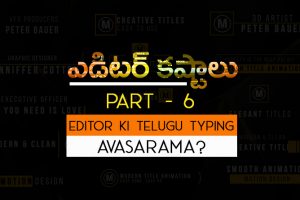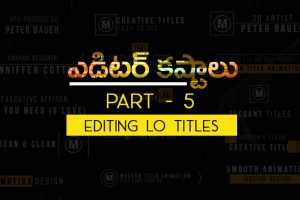How do you begin a Story Writing? – By Mayani Tharun Direction Faculty – D.F.TECH (FTIH)
HELLO FILMMAKER ‘S, FILM ENTHUSIASTS, FILM WELL – WISHERS, FILM DENIERS & FILM AGNOSTICS.
I have personally learned so much over the years with my passion, and always recommend to filmmakers at every level that they consume as much information as they can from credible blogs and resources online in order to continually further their knowledge base.
Since I started The Write Practice a few years ago, I’ve been trying to wrap my head around this question, how to write a good story. I’ve read books and blog posts on writing, taken classes, asked dozens of authors, and, of course, written stories myself.
The following ten steps are a distillation of everything I’ve learned about writing a good story. I hope it makes writing your story a little easier, but more than that, I hope it challenges you to step deeper into your own exploration of How to write a story.
Writing isn’t easy, and writing a good story is even harder.
Every one thought that, everything I Know about How to write a proper story, especially budding writers and filmmakers. Actually they don’t Know How to write a story.
Here I’m giving some information about story writing with my science (knowledge).
Guys just have a look on story writing process, how to Write/Narrate/Build a story with writing tools and elements.
So, let’s start at the beginning
STORY PROCESS
THOUGHT
|
IDEA
|
CONCEPT (Plan/In tension)-5 W’S & 1 H
|
STORY LINE
|
REFERENCES
|
SUBJECT
|
STORY OUTLINE
|
STORY
|
SCREENPLAY
|
SCRIPTING
|
FINAL DRAFT
3 COMPONENTS OF A STORY: CHARACTER
CONFLICT
SETTING
5 ELEMENTS OF A STORY: IDEA
SETTING
CHARACTER
PLOT
ENDING
ELABORATE STRUCTURE OF A STORY : EXPOSITION
FORESHADOWING
RISING ACTION
FALLING ACTION
RESOLUTION
- THOUGHT: Anopinion produced by thinking, It is completely depends on yours perception.
- IDEA: A suggestion as to a possible course of action, which you get the thought mould in a process.
- CONCEPT: The concept in the story is the bones, then the story premise is the first of the flesh. The premise is when your awesome concept Idea getting personal. In concept we are having tools like what, why, who, when, where and how ,with this we can build the series of sequences.
- STORYLINE: The plot & conflict of a whole story describe in a single line, for the quick and better understanding to the producer and audience.
- REFERENCES: The source or information regarding on the story work which kind of concept you chosen, mostly reference useful for Non-Fiction stories ,particular about character study,Dates,Names,etc.
REFERENCES are in several ways; Books, Online, Social media, people.
- SUBJECT: The form of making the concept in to a detailed story with the finalization of cuttings for the narrative manner.
- STORY OUTLINE: The limitations & Boundaries of a story. The Blue print of a story/Skeleton of a story. Simply writing about Beginnings, Middle, and Endings.
- STORY: An account of imaginary or real people and events told for entertainment.
Story is totally depends on your darling wishes, like we have types of story writing themes,
- FICTION
- SEMI-FICTION
- NON-FICTION
- SCREENPLAY: The way how can you narrate the story is simply called as screenplay.
Screenplay has 2 types:
Linear screenplay / Predictable screenplay; In this story can easily predicted by the readers and audience with the narration of foreshadowing events.
Ex. Linear screenplay likes A ————————-Z.
Nonlinear screenplay/ Unpredictable screenplay; In this story mingled with lots of suspense & Twists, readers and audience may didn’t get story easily.
- Nonlinear screenplay likes A——–Z——F—-C——X—-B (randomly).
- SCRIPTING: It is an Documentation of the final story in a particular format including with all developed scenes .In scripting we are having 2 formats,
- SINGLE COLUMN FORMAT (Universal wise used one).
- DOUBLE COLUMN FORMAT (In some countries like INDIA).
I Hope that u may get some useful information through this Article regarding on filmmaking,
I will be continued….rest of the topics about story writing in the Next Article.
Give me your’s valuable feedback…as well as drop a comment for which kind of Topics u want to know.
MAYANI THARUN D.F.TECH
(mayanitharun333@gmail.com)
FILMMKING FACULTY, DIRECTION.
FILM AND TELIVISION INSTITUTE OF HYEDARABAD.






